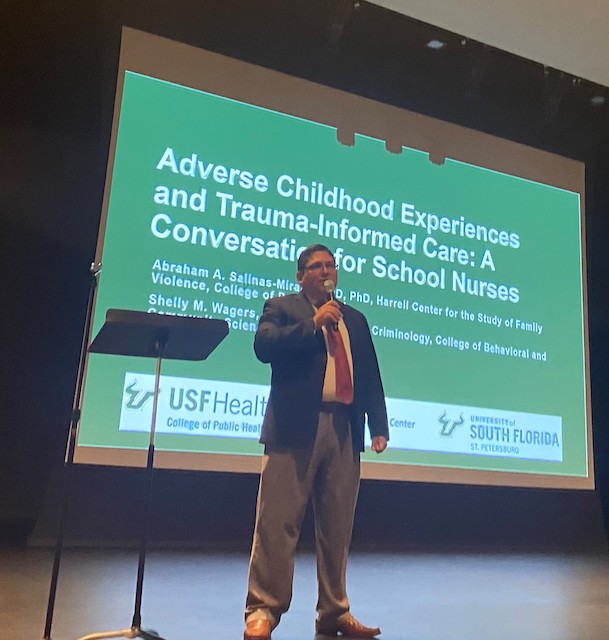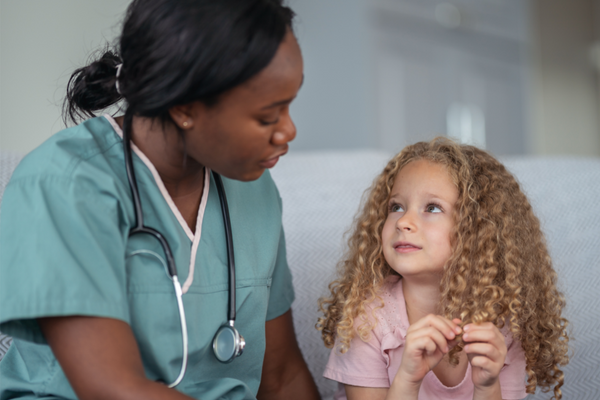Half of kids have experienced trauma. Can school nurses help?
According to the Robert Wood Johnson Foundation, 46 percent of U.S. youth—or 34 million children—have had at least one adverse childhood experience by age 18, and more than 20 percent have had two or more.
Adverse childhood experiences (ACEs) are potentially traumatic events such as the death or incarceration of a parent, child abuse, divorce, witnessing or being a victim of violence—in their own home or in the community—bullying, child neglect or living with someone who has been suicidal or had a drug or alcohol problem.

School nurses, who have regular access to children and their health concerns, can be a vulnerable child’s first line of defense. To help train school nurses in recognizing and responding to ACEs, the Hillsborough Public School System recently invited experts from the USF College of Public Health (COPH) and USF College of Behavioral and Community Sciences (Criminology) to its Summer Institute for School Nurses. The program also focused on trauma-informed care (TIC).
COPH faculty members who presented at the event included Dr. Abraham Salinas-Miranda, an alum and assistant professor who also directs the college’s Harrell Center on the Study of Family Violence, and Dr. Shelly Wagers, a USF associate professor of criminology (also affiliated with the Harrell Center). This event was organized in partnership with COPH’s Public Health Innovation and Research (PHIRE) and Lifelong Learning Academy, along with USF Health’s Area Health Education Center and Hillsborough County Public Schools.
“ACEs can exert a negative impact on school performance and learning,” notes Salinas-Miranda. “Many traumatized children experience physical and emotional distress that often are mistaken for other things, such as behavioral issues or inattentiveness. It also results in higher referral rates to specialized services in and outside the school. Trauma-related symptoms and their impact on the students’ lives also result in increased absenteeism. For all these reasons, it’s very important to have school personnel who can recognize ACEs and know how to implement TIC.”
Salinas-Miranda also pointed out that it’s important to prevent and address ACEs to improve population health. According to the Centers for Disease Control and Prevention (CDC), five of the 10 leading causes of death in the U.S. are associated with ACEs, including cardiovascular disease, cancer, respiratory diseases, diabetes and suicide. Individuals with four or more ACEs have about 30 times greater odds of attempting suicide, compared with those with no ACEs.

As part of the training, the nurses—400 in all—were immersed in what’s called problem-based learning (PBL) and simulation. They examined a case of child abuse (delivered to their phones via a web-based app) that’s likely to be seen in schools. The free app was developed with the help of one of the Harrell Center’s community partners, Humanistic Technologies, Inc. The nurses then worked through a series of questions (for example, what are the facts, what are the core trauma concepts, what are next steps) to help solve the problem.
“By equipping school nurses with knowledge and practical tools they can use to recognize childhood traumatic stress and its consequences on school health, we hope an improved response can be implemented in the school setting and reach families and children with needed referrals or services,” Salinas-Miranda commented. “Thus, we believe this training provided not only knowledge and skills, but also a form of advocacy to improve our community response to child traumatic stress.”
What are next steps? Salinas-Miranda and colleagues urge students and community partners to advocate for ACE prevention. They also hope to offer more training on topics related to family violence to health and social service professionals. These programs will be offered through the COPH’s Lifelong Learning Academy. In addition, the group also plans to offer graduate training on several other child advocacy study topics for a brand-new interdisciplinary graduate certificate in child advocacy studies.
Story by Donna Campisano, USF College of Public Health
